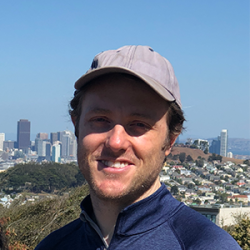
Christopher Wessels
( He/Him/His )Biography
I'm a San Francisco native who is fond of the topography, weather, food, people, and vistas of this wonderful city and the great Golden State of which it is part. No doubt, some of this fondness is a product of my schooling, as Bay Area schools have shaped my social and intellectual development from pre-K all the way to grad school. The odd mix of degrees I've earned--a B.A. in biology, B.S. in mechanical engineering, and an M.A. in philosophy--reflects the diversity of this area and its possibilities as much as it does my peculiar impulses to learn and be many things. Maybe the role of educator seems like a fitting end for someone of the latter persuasion, and I have taken to this role with eagerness over the past 11 years, despite the fact teaching was not a career aim of mine until after I'd already become one. That surprise has occasioned numerous reflections on the futility of planning out one's life too rigidly and on the wisdom of loosening one's grip on big aims. I suspect that the unforeseen invasion of a novel, highly-transmissible virus that has produced a multidimensional crisis of a scale unprecedented in our lifetimes has caused reflections of this sobering sort to become a regular occurrence in many of us. Though this result might seem regrettable, I'm encouraged by the thought that shared ease makes less of an impression on people than shared struggles; thus, we have reason to hope that we will emerge from this crisis with a greater sensitivity to fears and needs of a broad range people, and a renewed commitment to the betterment of each other's circumstances.
Interests
- Ethics
- Artificial Intelligence
- Philosophy of Risk
- Pedagogy (/Philosophy of Education
Recent Courses
- Arts of Quantitative Reasoning
- Philosophy and Film
- Formal Logic
- Theory of Knowledge
- Intro to Philosophy
- Critical Thinking
Forthcoming Publication
Peschard, I., Benetreau-Dupin, Y. and Wessels, C., Philosophy of Risk: Science and Values. Routledge (Under contract and submitted)
The topic of risk is as fascinating as it is ordinary. Risk is subjective and it is objective, individual and societal, personal and general; dealing with risk is, for a large part, what life is about and also what politics is about. Risk is about the world, but nothing that is in the world yet. There is risk only with regards to possibilities. But not some ‘in abstracto’ kinds of possibility; there is only risk when someone or something is ‘exposed’ to this possibility. It is a possibility that something ‘bad’ will happen to them, something that ‘we’, who see a risk there, view as a ‘bad’ thing, as bringing about some form of harm or loss. If we did not care about the future, about things turning out one way or another, we would not have the concept of risk. So, what we see as risks and what we do about them says a lot about ‘us’, about what and who we care about.
What we identify as risks, at the individual and societal levels, how we perceive them and how we manage them, shapes our lives and the societies we live in. It is present in all areas of life, and it is an object of study for a myriad of disciplines, social and physical sciences, philosophy, psychology, business, economics, interested in the physical, psychological, social, emotional, rational, or ethical dimensions of our experience. Risk or, more precisely, our composite experience with risk, raises questions for each of those disciplines.
As Wittgenstein says of length, to better understand what risk is for us, what it represents in our individual and societal lives, we need to understand better the different ways in which we relate to it, through what kinds of practice, from rational modeling to perception to assessment to management, what choices, goals and values are shaping those relations with risk. We learn what dealing with risk means by learning what it is to deal with risk, with all its intermingling aspects.